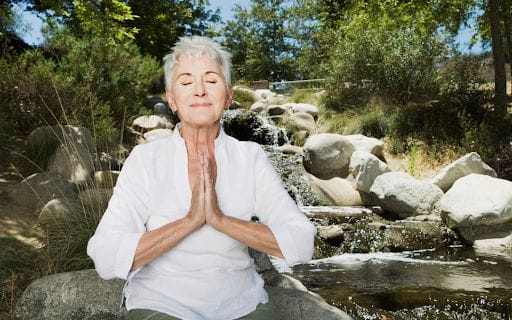(Hint: Both Can Help Caregivers Too)
Mindfulness and meditation are two activities that individuals of any age or physical ability can enjoy to nurture their body and mind. The practices have been successful in both senior and memory care. The caregivers that are watching over their loved ones can also experience positive benefits.
To quickly outline both practices:
- Meditation can take many forms, but it generally involves sitting in a comfortable position and allowing the mind to empty; via breath-work, focusing on a mantra, or listening to a guided prompt. The goal is to dedicate time to physical stillness and inward reflection.
- Mindfulness is more of a daily practice of living in the present, focusing on the current moment, emotions, and surroundings. The objective is to calm the mind, acknowledge feelings, and grow from them, in your everyday life.
Here are a few reasons that mindfulness and meditation should play a role in senior care.
Meditation is Easy to Learn and Teach
While there are definitely more complicated meditation styles, starting the practice is relatively simple! The activity requires few resources beyond a quiet and comfortable space, and a smartphone/speaker if you’d like to play soothing music or a guided meditation.
For caretakers or senior communities leading a meditation practice or class, you can consider a pose that is easier than traditional crossed legged on the floor. Have seniors sit upright in a chair with their ankles crossed.
For those who find it difficult to quiet their mind, guided meditation can be helpful. Apps like InsightTimer are free and have thousands of recorded meditations where a person leads you through a practice that matches your mood or goals. There are several other mindfulness apps with similar guides and tools to help along your journey.
Focus on The Present
Alzheimer’s or dementia patients often feel lost, confused, or irritable because they lose touch with their experiential foundation. They may have difficulty accessing memories or understanding what’s going to happen in the future. Alternatively, seniors with no cognitive issues can experience unpleasant feelings, whether they be sad about the past, or feel anxious about the looming future. Meditation and mindfulness teach participants to focus on the current moment, not to dwell in the past or worry about the future.
Prevents Loneliness
While loneliness is an emotion, according to Harvard Health, the grief and depression that comes from loneliness can be as detrimental smoking 15 cigarettes per day and is more prevalent among the elderly. Caregivers are also prone to loneliness and isolation. A UCLA Study found that meditation can hinder the common feeling of loneliness in seniors.
As one meditates and focuses on mindfulness, they become at peace with spending time with themselves and their thoughts. They may even look forward to time alone to meditate or take part in the mindful practices they’ve established.
Reduces Stress for Caregivers
Caregivers have an extremely stressful job. They are often looking after sick or elderly loved ones in addition to their own family, and on top of their everyday chores and careers. When caring for someone with Alzheimer’s or dementia, the job is even more complex and anxiety-inducing. Another UCLA study found that certain types of yogic meditation or chanting can reduce stress specifically for caregivers of those with dementia.
Slows the Progression of Degenerative Diseases
Meditation and mindfulness, in general, is known to relieve stress and ease anxieties, both of which can exacerbate dementia and Alzheimer’s symptoms. Further, research supports that those who regularly meditate can literally rewire their brain. There have also been initial studies that have shown that meditation and mindfulness can slow the progress of dementia and Alzheimer’s. Meditation improves functional connectivity in the areas of the patients’ brain that are most affected by the disease.
Practice Mindfulness and Meditation This Year
Meditation is an easy and calming activity that caregivers and seniors can practice together or on their own. Regular meditation can then lead to overall mindfulness. Both practices can increase capacity for happiness, reduce stress, and improve mental health and wellbeing. What’s more, meditation takes just minutes a day, with numerous benefits for senior care, memory care, and caregivers.

